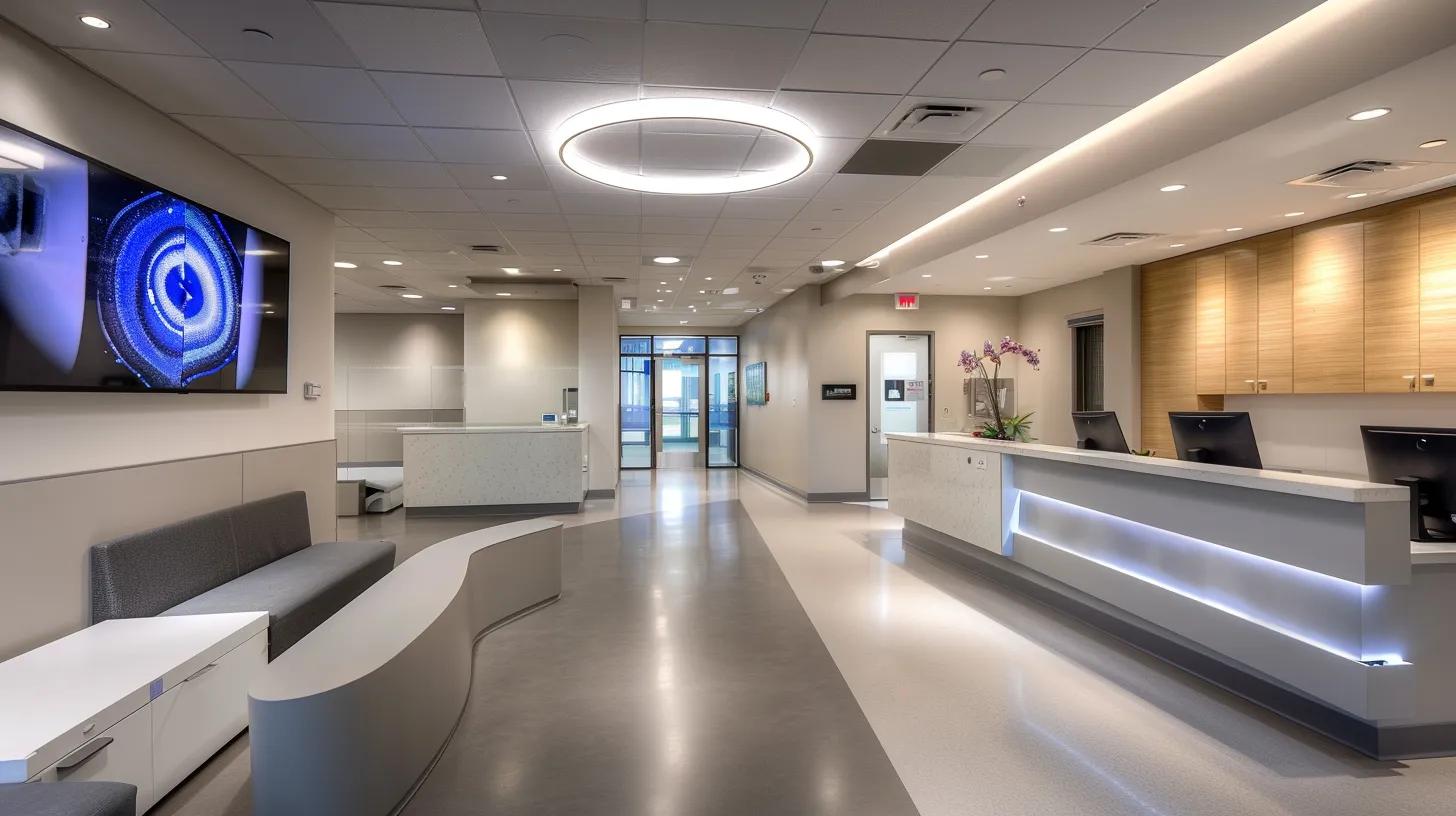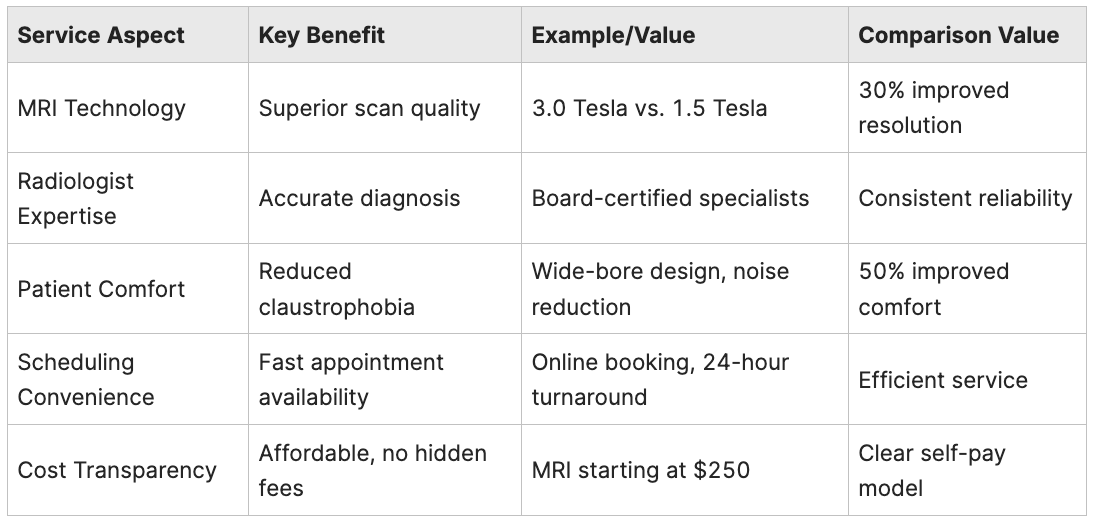
Choosing the best MRI provider in your area can be challenging when factors such as technology, radiologist expertise, patient comfort, scheduling convenience, and cost are considered. Patients need a provider that delivers state-of-the-art imaging, prioritizes patient safety and efficient diagnosis, and ensures a smooth exam experience.
With pricing starting at $299 and no hidden fees, some Miami-Dade providers offer MRI scans within 24 hours on a 100% self-pay model. This article outlines the key factors—from scan quality and radiologist credentials to advanced technology benefits and pricing details to help patients make an informed decision.
Selecting an MRI provider involves evaluating machine capabilities, radiologist expertise, patient comfort, accessibility, and cost transparency. Providers using modern MRI machines generally offer better imaging quality and faster report turnaround times, which can impact treatment decisions such as surgery or therapy modifications.
Transparent pricing details and self-pay models are vital for patients without insurance. Understanding these elements helps ensure that the provider meets high imaging standards while also addressing patient comfort and financial concerns.
The quality and accuracy of an MRI scan depend on the technology used. Modern machines produce higher-resolution images with faster scan times and advanced sequences that detect subtle soft tissue lesions or early signs of diseases, such as lung or prostate cancer. Machines with digital receivers and high-field magnets (typically 3.0 Tesla) generate clearer images than older models.
Additionally, techniques such as diffusion tensor imaging (DTI) improve the assessment of neural tissue integrity. In essence, advanced MRI technology enhances diagnostic accuracy and aids in effective treatment planning.
MRI scans require skilled radiologists with specialized training and board certification to accurately interpret subtle abnormalities. Even high-quality images can be misread if analyzed by inexperienced professionals. Board-certified radiologists, often with subspecialties in neuroradiology or musculoskeletal imaging, can reliably identify early indicators of tissue damage or joint problems. Their expert analysis not only confirms diagnoses but also guides referrals for further treatment, increasing patient confidence and ensuring coordinated care.
Patient comfort is critical as the exam can be stressful or even claustrophobic. Providers that prioritize comfort—using wider bore magnets, noise-reduction technology, and supportive measures—help reduce anxiety. For instance, a calming environment with music and ambient lighting, along with clear communication about exam procedures, can ease fears associated with confined spaces.
Accommodations for individuals with claustrophobia enable more patients to complete their exams smoothly, thereby reducing motion artifacts and improving image quality.
Convenient location and scheduling are key to minimizing stress and ensuring timely exams. Patients often prefer providers located near their home or workplace to reduce commute times. Urban centers like Miami-Dade frequently offer online booking systems, extended hours, and flexible appointment slots to meet busy schedules. Quick scheduling also enables rapid imaging in time-sensitive situations, such as emergencies, thereby enhancing overall patient satisfaction and care efficiency.
Verifying the credentials and experience of MRI providers is essential for ensuring high standards of care. Patients should verify that both the facility and its radiologists are certified and licensed by the relevant authorities. Detailed reviews, patient testimonials, and evidence of board certifications serve as indicators of expertise. Partnerships with institutions like Weill Cornell Medicine or the Hospital for Special Surgery further validate the quality of imaging services.
Patients should select MRI providers who hold certifications from accredited bodies, such as the American College of Radiology (ACR). These credentials confirm that equipment and protocols meet national quality standards.
Additionally, licenses to operate advanced imaging technology indicate compliance with strict industry guidelines, ensuring safe and reliable scans. Certification in MRI safety also signifies that the provider follows protocols to minimize radiation exposure and other risks.
Patients can verify radiologist expertise by reviewing online profiles, published case reports, or consulting professional board listings. Board certification, along with subspecializations in areas like neuroradiology or cardiac imaging, demonstrates rigorous training and continuous education. Reliable interpretation is especially important in complex cases, and patient portals or online directories often list this information for verification.
Patient reviews and testimonials offer third-party insights into the quality of an MRI provider’s service. They provide firsthand accounts of comfort, scheduling efficiency, and staff professionalism. Positive reviews indicate a history of excellent service, while critical feedback can highlight areas requiring closer examination.
These testimonials help patients set realistic expectations and choose providers that align with their healthcare needs.
A top MRI provider must offer a wide variety of scan types and ancillary services to meet diverse diagnostic needs. This includes common scans for reasons like knee pain or cardiac imaging, as well as specialized protocols for complex conditions such as neurodegenerative diseases and cancer screening.
Providers offering both high-resolution and functional imaging options can support comprehensive diagnostic and treatment planning. Customized scan protocols, pre-scan consultations, and detailed post-scan follow-ups are vital for optimizing diagnostic accuracy and patient outcomes.
Common MRI scans include brain, spinal, musculoskeletal (such as knees and hips), and abdominal or pelvic imaging. In urban settings, advanced imaging for stroke or cardiovascular assessments is often available. Some centers also provide specialized protocols for screening lung cancer or prostate cancer. Reputable providers use versatile equipment that handles routine and complex diagnostic needs effectively, simplifying the patient’s imaging journey.
Pre-scan preparation is key for ensuring that patients are informed and ready for their exam. Providers should offer clear instructions on fasting, medication, or specific clothing to prevent artifacts in the images. Pre-scan consultations relieve anxiety by explaining the procedure in advance.
After the scan, post-scan consultations allow radiologists to review findings, answer questions, and suggest next steps, thereby enhancing diagnostic accuracy and overall patient satisfaction.
Fast report turnaround is critical for early diagnosis and treatment. When MRI results are available within 24 to 48 hours, physicians can make prompt decisions, vital in emergencies like a suspected stroke or trauma. Rapid reporting reduces patient uncertainty and can be crucial in preventing complications. Providers investing in efficient workflows and advanced reporting systems are better positioned to deliver timely and coordinated care.
Advanced MRI technology drives improvements in diagnostic imaging by offering higher resolution, faster exam times, and enhanced patient safety. Cutting-edge machines reduce noise interference and include specialized imaging sequences that facilitate early disease detection. These technological breakthroughs allow physicians to detect small soft tissue abnormalities or early-stage cancers with greater confidence, which directly impacts treatment strategies and patient outcomes.
State-of-the-art MRI machines exhibit higher magnetic field strengths, increased signal-to-noise ratios, and dynamic imaging capabilities. For example, a 3.0 Tesla machine can yield up to 30% clearer images compared to older models.
Faster scanning protocols not only reduce the duration patients spend in the scanner but also maintain high image quality. These improvements result in more precise diagnoses and better overall treatment outcomes.
Modern MRI systems focus on patient comfort by incorporating wide-bore designs, reduced noise levels, and shortened exam times. Advanced technology can complete scans in 20 to 30 minutes compared to longer durations with older models. Additional amenities like ambient lighting and customizable music help soothe claustrophobia, ensuring patients remain calm and still, which in turn improves image quality.
Given the strong magnetic fields involved, safety features are paramount during an MRI scan. Providers should discuss their safety protocols, such as the use of non-ferromagnetic instruments and real-time monitoring of patient vitals. For patients with implants like pacemakers, understanding these protocols can reduce anxiety. Safety measures like automatic shutoff and emergency procedures are critical to preventing complications, underscoring the provider’s commitment to patient safety.
Even if insurance isn’t directly accepted, detailed billing statements may allow for reimbursement. Comparing pricing and financing options helps patients manage out-of-pocket expenses efficiently.
MRI pricing is influenced by the technology used, facility operating costs, and geographic location. Urban areas like Miami-Dade might have higher operating costs, but advanced diagnostics often justify these expenses with faster and more accurate results. Longer or more complex scans typically cost more, while self-pay centers may offer competitive rates starting at $250.
Patients should inquire directly with MRI providers about insurance acceptance and precise self-pay pricing. Using patient portals or contacting the provider for a detailed breakdown—including pre-scan consultations and post-scan report fees—can prevent unexpected charges. This verification process also helps in discussing available financing or installment plans.
Many MRI providers offer financing or flexible payment plans to ease the financial burden. Options such as installment payments or upfront payment discounts are common, particularly among self-pay centers with transparent pricing. Confirming the availability of these plans can help patients choose a provider that meets both their diagnostic and financial needs.
When scheduling an MRI appointment, it is important to ask detailed questions about the process, including preparation, what to expect during the exam, and follow-up procedures. Clear communication about these elements ensures a smoother experience and sets expectations regarding service quality and patient care.
Patients should receive comprehensive pre-scan instructions addressing fasting, the removal of metal objects, and appropriate clothing. It is also essential to inform the provider of any implants, allergies, or claustrophobic tendencies. Pre-scan consultations provide an opportunity to address concerns and clarify the steps of the exam, helping to avoid cancellations or delays.
During the MRI, patients should expect clear, step-by-step guidance from trained technologists. The exam is non-invasive and generally lasts 20 to 45 minutes. Patients are required to lie still on a padded table while the machine produces audible sounds. Understanding the procedure reduces anxiety and helps maintain image quality through minimal movement.
A timely follow-up is essential to receive and understand the MRI results. Many facilities offer quick digital report delivery via secure patient portals or direct consultations with radiologists. Scheduling a follow-up appointment to discuss findings and potential next steps is crucial for ensuring clear communication and effective subsequent treatment.
Finding a reliable local MRI provider can be achieved using trusted online tools, patient reviews, and detailed comparisons of service offerings. Patients in metropolitan areas may benefit from dedicated outpatient imaging centers, which often provide faster and more personalized care compared to hospital-based services. Key decision factors include proximity, cost, technology, and patient testimonials.
Online directories allow patients to search by zip code, review ratings, and filter results based on specific needs such as advanced imaging or low pricing. These platforms also aggregate patient reviews and offer links to provider websites where one can easily schedule appointments and compare costs.
Local imaging centers typically deliver greater convenience, shorter wait times, and competitive pricing through focused self-pay models. While hospitals offer comprehensive care, imaging centers often provide specialized diagnostic services with a personalized touch, leading to faster exam times and efficient report turnaround.
The final decision should strike a balance among imaging technology, radiologist expertise, scheduling convenience, and transparent price structures. Comparing online reviews, certifications, and cost breakdowns is essential, as is considering available financing options. A well-rounded assessment ensures that the chosen provider aligns with the patient’s healthcare goals and personal circumstances.

The table above summarizes the essential aspects of services, highlighting benefits and providing comparative values that help patients understand the strengths of each MRI provider. This information is critical for making an informed and balanced decision.